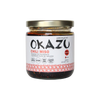FAQ old
1. What is OKAZU? How can I use it?
Okazu is a Japanese miso chili oil condiment that will regularly reside in your fridge door or on your dining table. Move over ketchup and mayo!
Similar in appearance to the chili oil typically found on the tables of Chinese dumpling houses, our unique recipes feature less heat and more umami-power! Made with sesame oil, miso paste, and spices, we created Okazu to eat with plain rice (which is eaten with nearly every meal in Japan), however, this condiment is amazingly versatile, pairing well with pasta, potatoes, veggies, meat, eggs and sandwiches. Just pop a dollop on and enjoy.
Okazu is all natural and preservative-free.
Watching people eat Okazu for the first time is fun. It's like giving cake to babies, but not as cute and with less mess. It also makes a great gift for anyone who likes to eat food.
Check out: How to use OKAZU and OKAZU Recipes
2. What is Miso?
3. What is Sakekasu?
4. Do your products contain any Allergens?
OKAZU contains soy and sesame. Curry flavour contains mustard.
OKAZU is manufactured in a gluten-free facility. Although this facility is not certified as nut-free, they do not process any tree nuts and peanuts.
Instant Miso Soup contains soy. Our Miso Soup is manufactured in a facility that also processes tree nuts and pine nuts, so we are unable to guarantee that it is nut-free
5. Are your products non-GMO?
Yes, all of our products are non-GMO certified by The Non-Gmo Project.
6. What is the shelf-life of your products?
OKAZU is a shelf-stable product. Once opened, it can hold in the fridge for up to 6 months.
7. Where can I find your product?
Check out our store locator to see where you can pick up our products:
https://www.abokichi.com/pages/store-locator
8. How long does shipping take?
We try to ship out product as quickly as possible, usually next-business day, using local courier services. We try to keep product as fresh as possible, which can sometimes mean we can be Sold Out of an item if there is a spike in sales, causing delays, although this is rare. You can expect your order within 3-10 business days of the ship date, depending on the distance.
9. Can I return/refund a product?
We are unable to accept returns as it is our policy to only send consumable goods directly from our facility. If there is an issue with your shipment or product, please let us know and we will do our very best to address the issue.
Cancellation of orders is usually not possible since they are sent for processing as soon as received, but we will try our best.
10. What is ONIGIRI?
Onigiri is a ball of cooked Japanese rice. It sometimes goes by another name, musubi. It is the equivalent of a sandwich in Japan, made in family kitchens, and also available at corner stores and delis all over the country.
Onigiri or musubi have been consumed in Japan for over a thousand years as a convenient and portable food to take into battle, while working in the fields, heading to the office or school, or on a train ride or picnic. It is the food of both hard work and leisure.
To make onigiri, all you need is rice, and it needs to be japonica rice, otherwise it wont stick. To make the rice ball more interesting and nutritious, different ingredients are often added as a filling or are mixed in with the cooked rice, and a nori wrapper is often added as a neat way to hold it in your hand.
Interview about onigiri with the head chef of Waketokuyama (a two Michelin star restaurant in Tokyo)
Press release by Onigiri Society in Tokyo
11. Which is the best rice cooker?
There is no straightforward answer to this question since you must understand your rice cooking needs before deciding on a machine. Here are some articles to help you make the right choice (we will add more in the future):
1. 4 Things You Need to Know Before Buying a Rice Cooker
2. You Should Never Buy a Rice Cooker that is Too Big for Your Needs
3. Why Are Induction Heating Rice Cookers So Hot?
4. The Science of IH Rice cooker (Coming soon)
5. Material of Internal Pot of Rice Cookers (Coming soon)
12. How can I cook good rice?
How to cook Brown rice - Bikkuri-daki -How to cook rice quiz; Fluffing
How to cook Maitake mushroom rice
13. What is haiga-mai (haiga-rice)?
Better than white & Brown rice; It's Haiga mai(Haiga-rice) !






